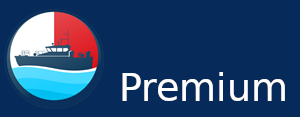We chatted on Monday afternoon, the eve of October 12. "When you work shifts, you don't take holidays into account and don't worry about when they are. We pilots do 73 shifts a year. Tomorrow it's my turn. I'm used to it. I work 24 hours and I get off the next four days. That's why there are five of us. If a seaman or a skipper is on sick leave, it is possible to find a replacement, but replacing a pilot is complicated," Walter del Río Corbeira analyzes. He is 47 years old (he will be 48 on Halloween), father of two children aged 15 and 12, and grew up in Agra do Orzán. "Although there is no tradition in my family, I always wanted to be a sailor. I studied at the Monte das Moas high school, and before that at the Emilia Pardo Bazán school. I remember riding the bus around Gran Canaria and passing by Nautica, where I finally ended up," he recalls. His first trip as a trainee student was to the Gulf of Guinea on a merchant ship carrying tropical timber. "We left from Pasajes. I remember it perfectly," emphasizes the senior pilot. "In A Coruña, the one who has been there the longest has this position. In other ports, such as Barcelona, there are elections. You could say that I represent the company in meetings with the Port Authority, among other things," explains Walter, who orders a decaffeinated coffee with milk.
We chatted on Monday afternoon, the eve of October 12. "When you work shifts, you don't take holidays into account and don't worry about when they are. We pilots do 73 shifts a year. Tomorrow it's my turn. I'm used to it. I work 24 hours and I get off the next four days. That's why there are five of us. If a seaman or a skipper is on sick leave, it is possible to find a replacement, but replacing a pilot is complicated," Walter del Río Corbeira analyzes. He is 47 years old (he will be 48 on Halloween), father of two children aged 15 and 12, and grew up in Agra do Orzán. "Although there is no tradition in my family, I always wanted to be a sailor. I studied at the Monte das Moas high school, and before that at the Emilia Pardo Bazán school. I remember riding the bus around Gran Canaria and passing by Nautica, where I finally ended up," he recalls. His first trip as a trainee student was to the Gulf of Guinea on a merchant ship carrying tropical timber. "We left from Pasajes. I remember it perfectly," emphasizes the senior pilot. "In A Coruña, the one who has been there the longest has this position. In other ports, such as Barcelona, there are elections. You could say that I represent the company in meetings with the Port Authority, among other things," explains Walter, who orders a decaffeinated coffee with milk.
Video The Port Authority of Jamaica | Critical Services - Pilotage
published on 15 April 2021
Pilotage is compulsory in all Jamaican ports and is a necessity for the safe passage and docking of ships entering and leaving the harbours. No ship or vessel can enter our Ports without the #PortAuthorityJa’s pilotage services. #MarinePilots, being the experts in local conditions, are required to assist in the navigation and manoeuvring of vessels in our channels and port areas and are dispatched to all ports in Jamaica on a 24 hour basis. Our #PilotBoatCrew ensures that Marine Pilots are...
Video Robust pilot boats of Netherlands and Belgium
published on 7 August 2020
These are some of the reliable sturdy Pilot boats of Netherlands and Belgium to bring and pick up Marine Pilots to and from commercial merchant vessels either inbound or outbound. The Marine Pilots are licensed PROFESSIONALS who have a thorough knowledge of a certain port and they guide the Master/Captain of commercial ships in and out of the foreign Seaport. Location: Steenbank Pilot Station, Flushing/Vlissingen Pilot Station, Wandelaar Pilot Station. Boats in order of appearance in this...
Video Transit of the Panama Canal with an XDF LNG Carrier on the Newly expanded locks under pilotage
published on 19 December 2020
Join me as we transit through the Panama Canal from the North-East side to the South-West. An interesting vlog on how an XDF LNG carrier transits through the newly expanded Panama Canal.Find out its history and which vessel and Captain transited the Canal on its opening day on the 15th of August 1914.The interaction with the Pilot Captain Arnulfo Cepetno who assist me on transit the Cocoli locks.
Video Pilot Boarding - Accidentology (2001- 2021) - French Maritime Pilots' Association
published on 10 May 2023
The accidentology survey conducted in France between 2001 and 2021 found that pilots face significant risks during transfer phases while embarking or disembarking from ships that they are required to serve. To ensure their safety and improve transfers, pilots develop specific procedures and safety protocols and equip themselves with the necessary gear. These safety measures are presented in the following film that is intended for both novice and experienced pilot boat drivers and pilots,...


